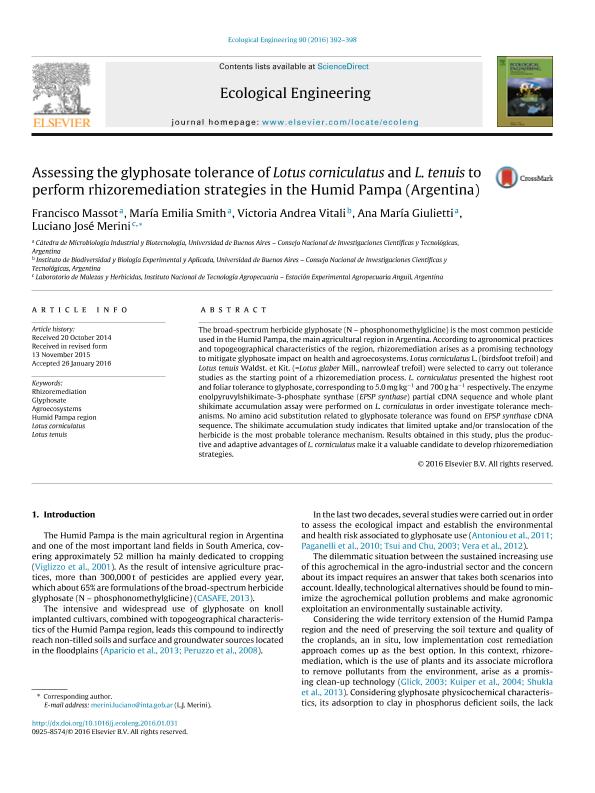Artículo
Assessing the glyphosate tolerance of Lotus corniculatus and L. tenuis to perform rhizoremediation strategies in the Humid Pampa (Argentina)
Massot, Francisco ; Smith, María Emilia
; Smith, María Emilia ; Vitali, Victoria Andrea
; Vitali, Victoria Andrea ; Giulietti, Ana Maria
; Giulietti, Ana Maria ; Merini, Luciano Jose
; Merini, Luciano Jose
 ; Smith, María Emilia
; Smith, María Emilia ; Vitali, Victoria Andrea
; Vitali, Victoria Andrea ; Giulietti, Ana Maria
; Giulietti, Ana Maria ; Merini, Luciano Jose
; Merini, Luciano Jose
Fecha de publicación:
05/2016
Editorial:
Elsevier Science
Revista:
Ecological Engineering
ISSN:
0925-8574
Idioma:
Inglés
Tipo de recurso:
Artículo publicado
Clasificación temática:
Resumen
The broad-spectrum herbicide glyphosate (N - phosphonomethylglicine) is the most common pesticide used in the Humid Pampa, the main agricultural region in Argentina. According to agronomical practices and topogeographical characteristics of the region, rhizoremediation arises as a promising technology to mitigate glyphosate impact on health and agroecosystems. Lotus corniculatus L. (birdsfoot trefoil) and Lotus tenuis Waldst. et Kit. (=Lotus glaber Mill., narrowleaf trefoil) were selected to carry out tolerance studies as the starting point of a rhizoremediation process. L. corniculatus presented the highest root and foliar tolerance to glyphosate, corresponding to 5.0 mg kg-1 and 700 g ha-1 respectively. The enzyme enolpyruvylshikimate-3-phosphate synthase (EPSP synthase) partial cDNA sequence and whole plant shikimate accumulation assay were performed on L. corniculatus in order investigate tolerance mechanisms. No amino acid substitution related to glyphosate tolerance was found on EPSP synthase cDNA sequence. The shikimate accumulation study indicates that limited uptake and/or translocation of the herbicide is the most probable tolerance mechanism. Results obtained in this study, plus the productive and adaptive advantages of L. corniculatus make it a valuable candidate to develop rhizoremediation strategies.
Archivos asociados
Licencia
Identificadores
Colecciones
Articulos(IBBEA)
Articulos de INSTITUTO DE BIODIVERSIDAD Y BIOLOGIA EXPERIMENTAL Y APLICADA
Articulos de INSTITUTO DE BIODIVERSIDAD Y BIOLOGIA EXPERIMENTAL Y APLICADA
Articulos(NANOBIOTEC)
Articulos de INSTITUTO DE NANOBIOTECNOLOGIA
Articulos de INSTITUTO DE NANOBIOTECNOLOGIA
Articulos(SEDE CENTRAL)
Articulos de SEDE CENTRAL
Articulos de SEDE CENTRAL
Citación
Massot, Francisco; Smith, María Emilia; Vitali, Victoria Andrea; Giulietti, Ana Maria; Merini, Luciano Jose; Assessing the glyphosate tolerance of Lotus corniculatus and L. tenuis to perform rhizoremediation strategies in the Humid Pampa (Argentina); Elsevier Science; Ecological Engineering; 90; 5-2016; 392-398
Compartir
Altmétricas



